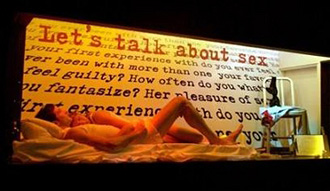 |
 |
 |
 News from Around the Americas | October 2006 News from Around the Americas | October 2006  
"Sexsomniacs" Puzzle Medical Researchers
 Reuters Reuters


| | Models are seen in a display about sex in the lobby of the Standard Hotel in Sunset Strip in Los Angeles, California. (Jim Ruymen/Reuters) |
Researchers are struggling to understand a rare medical condition where sufferers unknowingly demand, or actually have, sex while asleep, New Scientist magazine reported this week.

Research into sexsomnia - making sexual advances toward another person while asleep - has been hampered as sufferers are so embarrassed by the problem they tend not to own up to it, while doctors do not ask about it.

As yet there is no cure for the condition, which often leads to difficulties in relationships.

"It really bothers me that I can't control it," Lisa Mahoney told the magazine. "It scares me because I don't think it has anything to do with the partner. I don't want this foolish condition to hurt us in the long run."

Most researchers view sexsomnia as a variant of sleepwalking, where sufferers are stuck between sleep and wakefulness, though sexsomniacs tend to stay in bed rather than get up and walk about.

While sleepwalking affects two to four percent of adults, sexsomnia is not thought to be as common a problem, according to Nik Trajanovic, a researcher at the sleep and alertness clinic at Canada's Toronto Western Hospital.

But an Internet survey of sexsomniacs carried out in 2005 that drew 219 reliable respondents concluded it was more prevalent than medical case reports alone might suggest.

"Most of the time sleep sex occurs between people who are already partners," Mark Pressman, a sleep specialist at Lankenan Hospital in Wynnewood, Pennsylvania, told the New Scientist.

"Sometimes they hate it," added Pressman of the reactions of sexsomniacs' partners. "Sometimes they tolerate it. On rare occasions you have stories of people liking it better than waking sex."

With no cure, addressing triggering factors - stress or sleep deprivation - can help, while Michael Mangan, a psychologist at the University of New Hampshire in the U.S. has set up a Web site, www.sleepsex.org, to help sufferers.

Meanwhile Trajanovic is devising a procedure for diagnosing sexsomnia in legal cases where sufferers have been accused of sexual assault. | 
 | |
 |



